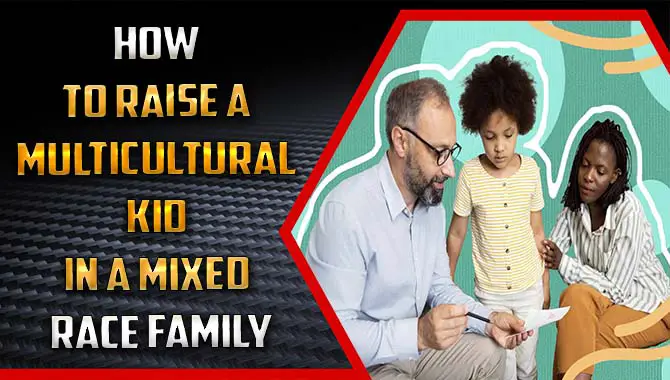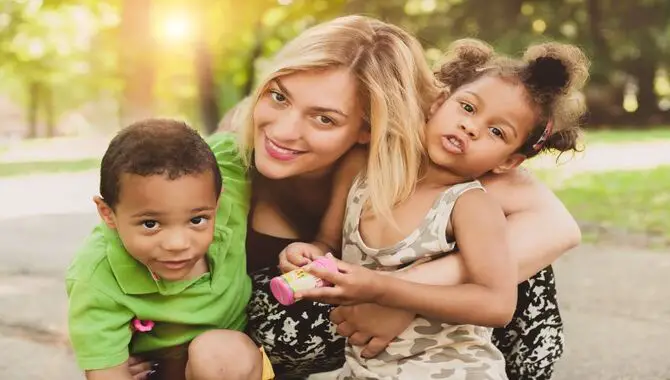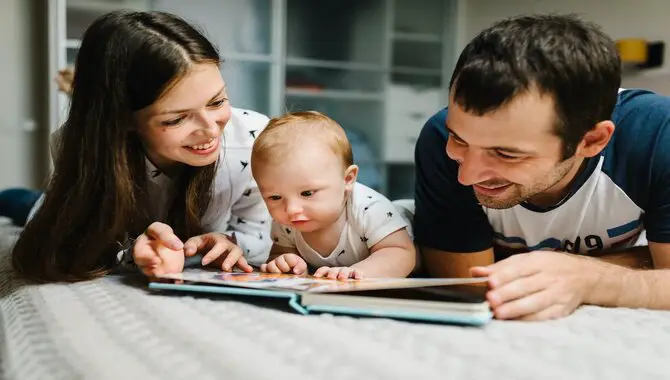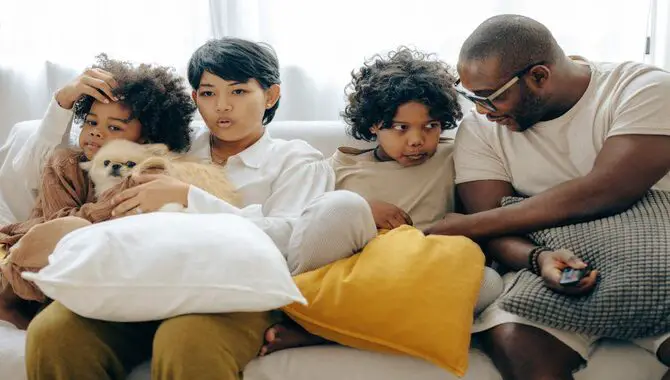Raise a multicultural kid in a mixed race family can be a challenging affair. You’re dealing with two cultures colliding, and knowing how to handle the situation can be difficult.
Raising a multicultural child can be an enriching, fulfilling experience but does not come without challenges. Parents need to understand their child’s unique identity and build a strong foundation for them to grow from. As parents, you are the one who has the most influence on your child. This blog will cover many tips on raising a multicultural kid in a mixed-race family.
From teaching her about different cultures and religions to helping her feel comfortable in her skin and with her multiracial family. We hope you’ll find the information here helpful in your journey to raising a multicultural kid.

10 Tips To Raise A Multicultural Kid In A Mixed Race Family

The multicultural kid in a mixed-race family can benefit from getting to know the cultural heritage and customs of the people they live with. This way, your child can learn about different cultures and develop critical thinking and problem-solving skills.
It’s essential to help your child develop a healthy respect for diversity and encourage them to learn about other cultures. This will help them develop a positive self-image and appreciate the value of different perspectives.
1.Speak Your Language
It’s essential to raise your multicultural child in a way that celebrates their heritage and culture. It’s necessary to help them learn about the language and customs of the group to which they belong. Additionally, it’s necessary to teach them the importance of speaking a second language and embracing their multiethnic identity. You can do this by exposing them to different cultures regularly and discussing issues relating to identity and acceptance in your family and community. This will help them learn from different perspectives, become more accepting of others, and feel proud of who they are.
2.Talk About Race And Racism
It is essential to have open communication with your children about race and racism. Discussing these topics can help them understand and respect different cultures. It is also important to model positive interactions between other races. Instead of avoiding the case, be a positive role model by showing your children that they can be successful despite having a mixed-race background.
Demonstrating this attitude can promote tolerance and diversity in your family. You might consider taking your children on a multicultural vacation or enrolling them in activities that promote global understanding. In addition to discussing race and racism openly, it’s crucial to show them how different cultures impact your life as a family.
3.Emphasize Both Cultures
It’s essential to emphasize both cultures in multicultural kids’ upbringing. Ensure you provide them with a balanced education that includes exposure to both cultures. Please encourage your child to explore their cultural roots and participate in activities from both cultures, cultural activities, or social gatherings.
By believing in your child and giving them the support they need to thrive in a multicultural household. You can help them develop an understanding of different perspectives and learn to appreciate the unique qualities of other cultures. As they grow up, multicultural kids can see the value of intercultural and multiethnic interactions, which is vital for building community and creating positive change in today’s society.
4.Pass On Your Traditions

When raising a multicultural child, it’s essential to pass on your traditions while providing your child with a wide range of cultures to explore. One way to do this is by making time for cultural festivities and celebrations with your child’s various family members. This will help strengthen the bonds between you and your child and allow them to learn about different cultures and customs.
It is also important to model positive multicultural relationships yourself. For example, if you are from a mixed-race family, try showing respect for the different backgrounds of your family members. When raising a multicultural child, be open to dialogue about sensitive topics and promote intercultural understanding in all aspects of your life.
5.Talk About Your History
If you want to raise a multicultural child in a mixed-race family, you must talk about your history and culture. Start by sharing stories about your ancestors’ lives and memories of their home country. Invite your children to visit different parts of the world, especially places where they can learn about other cultures and religions.
It would be best if you also created a home environment that is tolerant and accepting of diversity. Instead of forcing your child to assimilate into one culture or ethnicity, focus on celebrating the unique aspects of their heritage. Finally, while it’s natural for parents to want their children to fit in with their cultural identity, avoid assimilation by creating an atmosphere of acceptance and tolerance in your home.
6.Mark Your Cultural Festivals
It’s essential to mark your cultural festivals so that your multicultural child knows when to celebrate their heritage. These celebrations can teach them about their family history and cultural identity. They can also help children learn about other cultures by exposing them to traditional foods and customs.
When raising a multicultural child, it’s important to model positive cultural values, such as respect for others. This can help children grow up with a strong sense of identity and pride in their heritage. If you’re struggling with raising a multicultural child, reach out to a community resource or therapist for support. They can help you learn parenting skills and navigate the challenges of parenting a child from a diverse background.
7.Demonstrate The Importance Of Traditional Greetings
It’s essential to demonstrate the importance of traditional greetings when raising a multicultural kid in a mixed-race family. Showing your child how to say hello, goodbye, and thank you in various languages can help them feel comfortable in different social settings.
Also, modeling good behavior and proper etiquette when interacting with people from different cultures can help build your child’s confidence and social skills. By teaching your child about the importance of culture and diversity, you’re helping them make a foundation for a successful future.
Demonstrating how you celebrate traditions from different cultural backgrounds, you’re helping your child develop an appreciation for different cultures and become more tolerant and inclusive toward others.
8.Visit Your Home Country With Your Children

If you and your children live in a mixed-race family, one way to help your multicultural kid feel more connected to their home country is to visit it with them. This will allow them to learn about their culture and heritage firsthand.
Another essential thing to remember is that cultural and ethnic traditions are often passed down through families, so involve your kids in these activities and teach them about your own culture. You can explore your family’s heritage through genealogy research or by participating in cultural activities. Finally, be sure to teach your kids about the different cultures of the people in your community and worldwide.
9.Foster Close Relationships With Your Children’s Grandparents

It is vital to foster close relationships with your children’s grandparents. This will help them learn about their cultural heritage and build close relationships with their extended family. It’s also essential for your child to have a diverse range of role models, as this will help them develop strong values and perspectives. Having a diverse range of people in their life can help them grow and thrive as individuals.
It is excellent if Grandparents can play an active role in the lives of their grandchildren, helping with schoolwork, playing games, and celebrating special occasions. By participating in these activities, grandparents can help strengthen the bonds between parents and children.
10.Give Your Children The Freedom To Adapt Culture To Who They Are As Third-Culture Kids
Doing an excellent job raising a multicultural child can be challenging, but it is possible with some preparation and patience; giving your child the freedom to adapt to culture to who they are as third-culture kids are critical.
To help your child develop a strong self-identity, encourage them to explore their roots and heritage. Show them how their diverse cultural and social backgrounds are essential to their identity; this will help them develop a strong sense of identity. Additionally, please provide them with examples from your family’s rich history and traditions.
This will help build their confidence and understanding of different cultures. Lastly, communicate positively and critically about other cultures, and help your child learn how to converse about various topics and perspectives respectfully.
Importance Of Raising A Multicultural Kid
Raising a multicultural kid is essential for both your child and the community. It’s vital to provide your kids with diverse cultural experiences so they can learn about various beliefs, customs, and traditions.
This helps them understand that everyone is different and there is no “right” way to be. Besides, it’s essential to help your kids identify their strengths and weaknesses and develop a positive self-identity. This will help them appreciate their unique traits and abilities and learn to embrace diversity.
Additionally, you should teach your kids how to communicate with people from different cultures and backgrounds. Teach them the importance of respecting others regardless of their race or background. Help your kids develop a positive self-image by supporting their interests and aspirations.
Finally, encourage your children to get involved in community service initiatives. This will help them develop social skills and an understanding of global issues. Raising a multicultural kid yourself can help foster a society that respects different ethnicities and cultures.
What To Keep In Mind If You Are Raising A Multicultural Kid?

If you are raising a multicultural child, it’s essential to take the time to get to know your son or daughter from different cultures. This will help develop a positive relationship with other cultures and help foster a positive view of diversity.
When respecting cultural differences and prohibitions, ensure your child understands that different cultures have different ideas about what is acceptable and what is not. This will help them develop a more tolerant attitude toward other cultures.
It’s also vital to help your child develop a positive attitude toward other cultures. This can be done by highlighting the beauty and uniqueness of different cultures and celebrating the similarities between different cultures. It can also be done by fostering a positive relationship with your extended family from other cultures.
Conclusion
Well-educated parents are the ones who help raise multicultural children. They should understand the parenting challenges of raising multiracial children and seek support from professionals. A multicultural family can help boost a child’s self-esteem, identity, and social skills development by celebrating cultural heritage events with them and introducing new experiences to broaden their worldview.
It is essential to keep open communication channels between parents and children during this adjustment period and provide your child with the cultural resources they may need to establish an identity. By following the above tips on raising a multicultural kid in a mixed-race family, you can ensure that your child feels accepted in their new culture while adapting to yours.
Frequently Asked Questions:
How Do I Raise A Multicultural Kid In A Mixed-Race Family?
Raising multicultural kids is definitely not an easy task, but with a little effort, you and your children can make it work. Here are a few tips to help you out:
1.Talk to your kids about the different cultures they will encounter.
2.Help your kids develop a positive view of themselves as multicultural people.
3.Encourage your kids to learn more about their culture and heritage.
What Best Way To Raise A Multicultural Kid In A Mixed-Race Family?
Parenting a multicultural child can be difficult, but you can do a few things to make it easier.
The first thing you can do is be proactive and try to understand your child’s cultural background. By doing this, you can prepare yourself for the challenges that await and make parenting easier overall.
What’s The Best Parenting Book For Raising Multicultural Kids?
Some good parenting books that may be helpful when raising multicultural kids include “The Whole Child” by Rick Hanson and “Raising Kids Thinking Critically.”
One of the most important things you can do as a parent is to provide your kids with diverse cultural experiences. This can be done through outings to various ethnic restaurants, museum visits, or weekend trips to another city.
Should I Use Discipline Or Rewards With My Kids?
Parenting styles usually come down to two options: rewards or discipline.
Rewards are a great way to encourage good behavior in kids by giving them things like dessert after completing a chore, while punishment involves sending the child to their room without dinner. Varied discipline methods will help to foster a sense of independence in your children.
How Can I Get My Son To Read More And Stop Using His Phone So Much?
Getting your son to read more is a great way to bond with him, help him get better grades, and spend quality time together. You can start by talking to him about why it is essential to read. Then encourage him to get involved in extracurricular activities or hobbies. Lastly, make time for family dinners and spend time together. This will help you connect and have open conversations about sensitive topics such as race and ethnicity.

I’m a writer and blogger who loves to talk about entertainment, culture, and relationships. I love to share my thoughts and insights on these topics, and I’m always looking for new ways to engage with my readers. I’m also a big fan of learning new things, so I’m always exploring new areas of interest.
